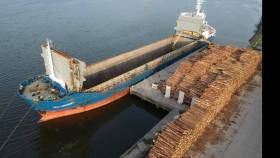Displaying items by tag: Timber Trade
A cargoship which first visited the Port of Sligo in recent months featured on RTE News when docked again in the port at the weekend which coincided with the National Famine Commemoration, writes Jehan Ashmore.
At the remembrance event attended by An Taoiseach Leo Varadkar, the congregation were told that the depopulation was described as the most traumatic event in Ireland's history. This led to a mass exodus of people forced to flee famine ravaged lands and head to ports such as Sligo where over 40,000 from the north-west region alone emigrated between the years 1841 and 1851.
Thankfully present day times are far removed from such devestation as the port last weekend was engaged in trading cargo and not the carriage of passengers under such dire circumstances. The cargo involved round timber (logs) which having awaited export at the Deepwater Quay, one of the port's two commercial quays, was loaded on board the more aptly named Sea Harmony given the context of the passage of time.
On a related note it was in recent years where at this same quay, Afloat reported on the Arundo, another short-sea trader which called to the Port of Sligo. On that occasion the cargo was an import which saw the discharge of lignite (coal) which was loaded in Rostock, Germany.
According to the Port of Sligo, trade figures have increased and they now have passed last year's total figures. The port also added that the trade forecast for the rest of the year is looking great as the port hopes to double the number of ships this year.
As for the whereabouts of Sea Harmony, the ship has since sailed from Sligo (the only commercial port between Galway and Derry) where further along the northern coast today Afloat tracked the vessel offshore of County Antrim. The 1991 built vessel is bound for Birkenhead in the UK, where in the north-west of England the role of shipbuilding is making something of a comeback.
The presence of Sea Harmony on Merseyside is no stranger in these waters as the 2,482 gross tonnage vessel has also previously traded in timber. This took place in January as the same small ship has called to another Irish port but in the opposite region at Rosslare Harbour located in the south-east.






























































